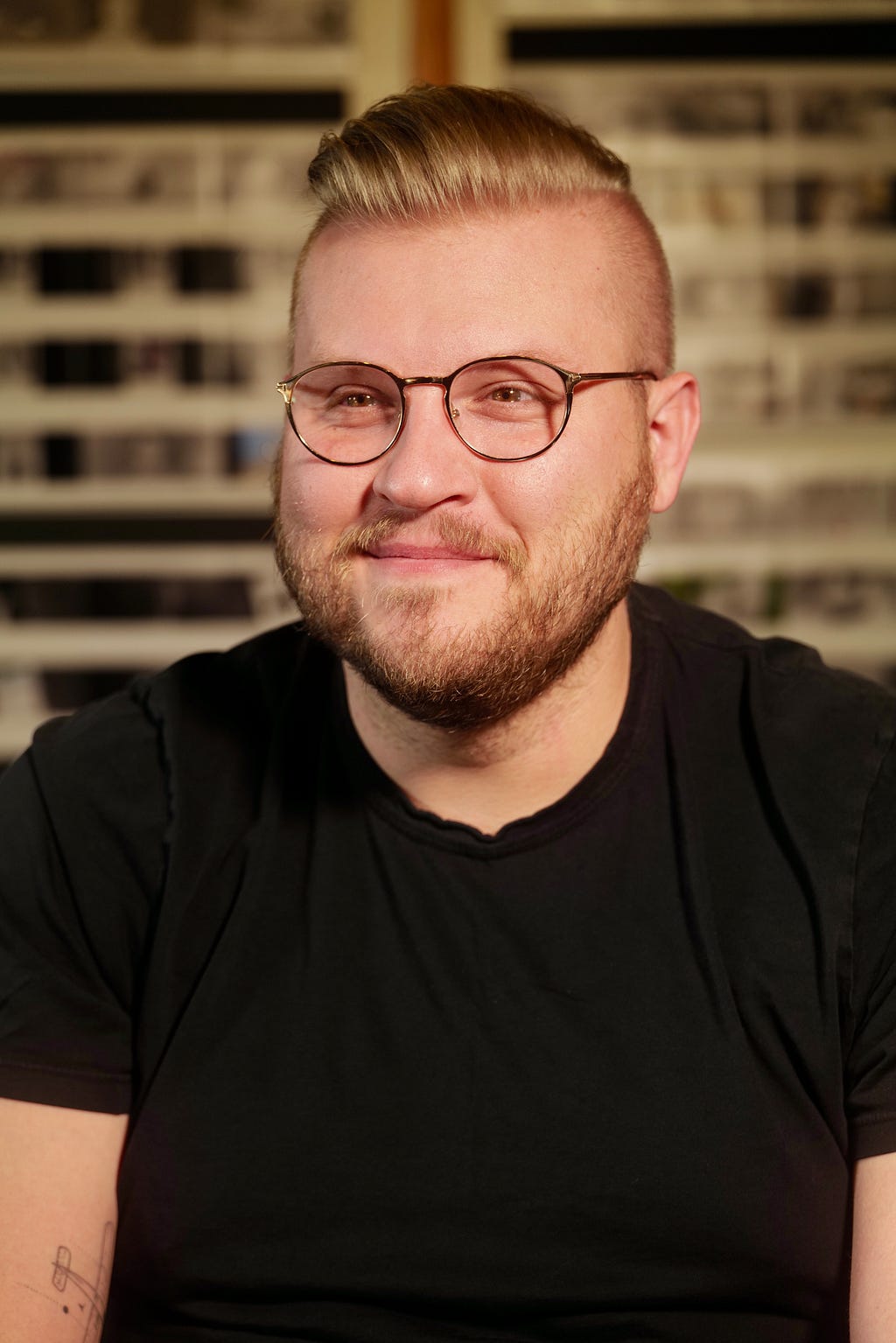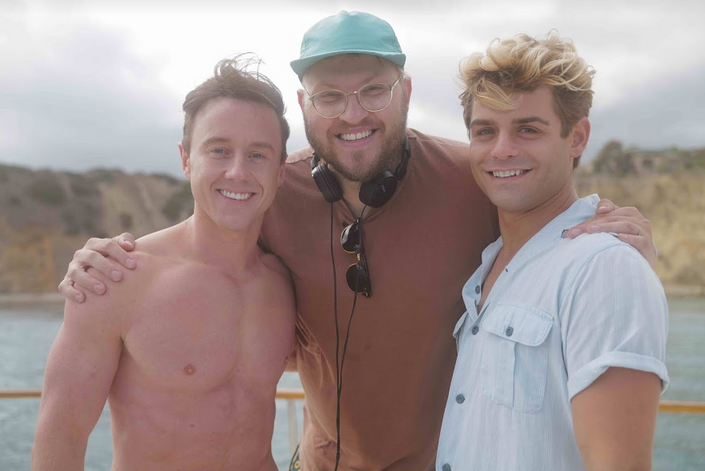Andrew Vallentine of The Letter Men: 5 Things I Wish Someone Told Me When I First Became A Filmmaker

Be prepared for failure. I’ve had so many close calls and stumbles along the way. Each time it feels like you’ll never possibly recover but this is an industry where resilience and perseverance can pay off. Remember that it’s not the failure that matters, it’s how we respond to the failure.
As a part of our series called “5 Things I Wish Someone Told Me When I First Became A Filmmaker”, I had the distinct pleasure of interviewing Andrew Vallentine.
Andy is considered one of the premier up-and-coming directors in Los Angeles. He draws his creative inspiration from the forged-in-fire experience of being a dyslexic gay kid in small-town Michigan. What was once his shame he now considers his greatest strength.
He is currently in post-production for his first feature film THE MATTACHINE FAMILY, written by creative partner and husband Danny Vallentine. This film is being produced by Zach Braff (GARDEN STATE), Scot Boland (LORD OF THE RINGS), and Mike Diaz. The film stars Nico Tortorella (YOUNGER), Juan Pablo Di Pace (FULLER HOUSE), Emily Hampshire (SHITTS CREEK), and Emmy Nominated Carl Clemmons-Hopkins (HBO’s HACKS).
Andy has developed content with Amy Baer at Gidden Media, Tyra Banks with Bankable, and most recently has been hard at work developing a WWII series based on the newly discovered real love letters sent between two gay British soldiers in the 1940s. He is working to bring this remarkable true story to life with Brian Volk-Weiss at the Nacelle Company.
He has worked with recording artists like Charlie Puth and Tritonal and popular media personalities like Patrick Starrr and Joey Graceffa. He has created commercial and branded content for Mercedes-Benz, MAC Cosmetics, Sephora, The Department of Veterans Affairs, The Ad Council, Goodwill, and Major League Baseball. Andy’s combined content has been viewed over 1 billion times.
Thank you so much for joining us in this interview series! Our readers would love to get to know you a bit better. Can you tell us a bit of the ‘backstory’ of how you grew up?
I’ve always known I’ve wanted to be a filmmaker. I’m dyslexic and queer, so growing up in a conservative household in a small town wasn’t always easy. Fortunately, I found an outlet and a sort of escape through watching films and making videos. Those early hardships have actually become assets and defined my work as a filmmaker.
Can you share a story with us about what brought you to this specific career path?
Sure! A long time ago, a bunch of my college friends and I made this fake Adele music video. We had a friend that looked like Adele, and I thought it would be fun to make a spec music video with her. So we tapped all our resources and called in all our favors to make it and it actually went viral! It ended up getting millions of views and even a letter from Adele’s attorney requesting that we clarify that it actually was not Adele. This was my first taste of success and it kickstarted my career as a professional filmmaker in Los Angeles.
Can you share the funniest or most interesting story that occurred to you in the course of your filmmaking career?
When I first read the story about Gilbert and Gordon in the BBC I made an uncharacteristically bold decision to reach out to Mark, the owner of the letters. Looking back, it seems so wild to me that I had the confidence to think that I had any right to try and get the option for this incredible story. At that point in my career I was still making videos for other people. The idea of getting to tell a story that was meaningful to me drove me to take whatever measures necessary to secure the rights to this remarkable love story. I ended up reaching out to Mark and then flying to the UK to meet with him personally to make my case. Within just a few weeks I went from reading about this story to sitting in Mark’s dining room while we read through the letters together. Of course, my big gesture and my clear passion for the story paid off, but people are always surprised to hear the lengths I was willing to go to make this happen.
Who are some of the most interesting people you have interacted with? What was that like? Do you have any stories?
I worked with Nico Tortorella, Juan Pablo Di Pace, and Emily Hampshire for my upcoming indie feature, The Mattachine Family. This was my first experience working with actors over several weeks and it was such a revealing experience to see them work. They brought so much to the film and taught me so much about directing.
None of us are able to achieve success without some help along the way. Is there a particular person who you are grateful towards who helped get you to where you are? Can you share a story about that?
Undoubtedly I wouldn’t be where I am today without my husband and creative partner, Danny Vallentine. He challenges me to be better and do better every day.
Can you please give us your favorite “Life Lesson Quote”? Can you share how that was relevant to you in your life?
Growing up my dad always told me “never let someone tell you no.” I had a really hard time when I was in school. Because I had a learning disability there were so many people who thought that there were things I couldn’t or shouldn’t try to do. I even had a teacher tell me once that I would never go to college. Whenever I encounter something difficult or hard, I always think about my dad encouraging me to push forward.
I am very interested in diversity in the entertainment industry. Can you share three reasons with our readers about why you think it’s important to have diversity represented in film and television? How can that potentially affect our culture?
The first thing I’ll say is that there is something very powerful about seeing yourself represented in the stories being told in film and television. Television and film should reflect the world around it. Second, when we commit to diversity on screen we get to see stories that have never been told before. Third, representing diversity also brings in diversity of perspective which in turn enriches our ability to tell compelling, important stories that resonate with all audiences.
What are some of the most interesting or exciting projects you are working on now?
I’m just wrapping up my first feature film, The Mattachine Family! The film is a beautiful LGBTQ+ indie feature about one man’s journey to find his chosen family. The film was written by my creative partner and husband Danny Vallentine and it draws on our own personal journey to fatherhood. This film is being produced by Zach Braff (Garden State) and Scot Boland (The Hobbit: An Unexpected Journey, The Walk). The film stars Nico Tortorella (Younger, The Walking Dead: World Beyond) and Juan Pablo Di Pace (Mamma Mia!, Fuller House). You can look for it as it hits the festival scene in late 2022 or early 2023. This film celebrates family, community, and identity. It champions queer people and immortalizes our lives and experiences by emphasizing the things we all have in common.
Which aspect of your work makes you most proud? Can you explain or give a story?
I’m really proud that my first big projects — The Letter Men and The Mattachine Family — are inclusive LGBTQ+ stories that have never been told before. I am also immensely proud that I got to tell them with my husband. I eventually want to tell all types of stories but it’s really special that these films also have that added significance for me personally.
Ok super. Here is the main question of our interview. What are your “5 things I wish someone told me when I first started” and why. Please share a story or example for each.
1. Be prepared for failure. I’ve had so many close calls and stumbles along the way. Each time it feels like you’ll never possibly recover but this is an industry where resilience and perseverance can pay off. Remember that it’s not the failure that matters, it’s how we respond to the failure.
2. Everything you make is not Spielberg-worthy — that is okay! I look back at my early work from time to time and all I see are the flaws and things I wish I could have changed. I don’t think I’ve ever met someone who was completely happy with something they made. Art is meant to be imperfect.
3. 99% of the time you will be told no. I once read an interview with Emma Thompson where she talked about how, even though she’s won an academy award for screenwriting, she has written so many things that she has loved and believed in completely and yet they have never been made. ‘No’ will be the default response to most people, but it doesn’t mean you stop chasing the ‘yes.’
4. Find ways to keep your passion alive. All the things I’ve mentioned so far can really wear you down, so it’s important that you always have something that nourishes you and keeps you motivated.
5. Say yes to everything early on. I can’t emphasize enough how important it is to get hands-on experience with filmmaking. The best way to do this is to say yes to every opportunity you get, even the ones that terrify you. Not only will you learn valuable skills but you will also meet so many people who will later become important collaborators and colleagues.

When you create a film, which stakeholders have the greatest impact on the artistic and cinematic choices you make? Is it the viewers, the critics, the financiers, or your own personal artistic vision? Can you share a story with us or give an example about what you mean?
Filmmaking is so special because it is a truly collaborative process so it is always important to me to assemble a team of people whose expertise and perspectives I trust implicitly to help me make decisions. Ultimately, however, the decisions made are mine and it’s important to me that I stay true to my vision for the film. That is the role of a director.
You are a person of great influence. If you could start a movement that would bring the most amount of good to the most amount of people, what would that be? You never know what your idea can trigger. 🙂
Climate change is the greatest threat to everyone on this planet right now. I hesitate to say that I would like to start a movement to confront the peril of climate change because there are already so many great leaders fighting this battle, but I would certainly love to use whatever influence I have to help.
We are very blessed that some of the biggest names in Business, VC funding, Sports, and Entertainment read this column. Is there a person in the world, or in the US whom you would love to have a private breakfast or lunch with, and why? He or she might see this. 🙂
100% Steven Spielberg. So many of his films shaped my childhood and his new films still speak to me today.
How can our readers further follow you online?
Yes, the best way to follow me and my work is on Instagram @andyvallentine
This was very meaningful, thank you so much! We wish you continued success!
Andrew Vallentine of The Letter Men: 5 Things I Wish Someone Told Me When I First Became A… was originally published in Authority Magazine on Medium, where people are continuing the conversation by highlighting and responding to this story.
